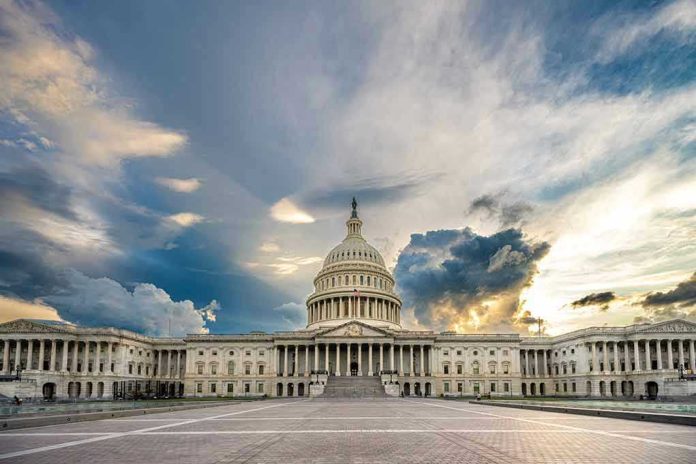
Senate Republicans are poised to fundamentally change confirmation rules after Democrats blocked over 150 of President Trump’s nominees, igniting a fierce debate over the future of Senate tradition and the balance of power in Washington.
Story Snapshot
- Senate adjourns for summer with over 150 Trump nominees stalled after Democrats use procedural tactics to block confirmations
- Republicans vow to pursue a “nuclear option” rule change in September to expedite the process
- Democrats warn this escalation will erode Senate minority rights and break with two centuries of precedent
- The standoff reflects deep partisan divides and ongoing fallout from the previous administration’s controversial legacy
Senate Gridlock Leaves Trump Nominees in Limbo
More than 150 of President Trump’s executive and judicial nominees remain unconfirmed as the Senate heads into its August recess. Senate Democrats have unified around procedural tactics—including denying unanimous consent and blocking voice votes—to slow or halt nearly every nomination. Senate Majority Leader John Thune characterized the scale of obstruction as “unprecedented,” noting that not a single Trump nominee has advanced by voice vote or unanimous consent this session, a sharp break from longstanding bipartisan norms. The backlog now threatens to paralyze key federal agencies and the judiciary, with only Secretary of State Marco Rubio advancing without objection this term.
President Trump has responded by ramping up pressure on Senate Republicans, demanding rapid confirmation of his appointees. Trump praised GOP efforts to “fight…to get my great Appointments approved,” framing the standoff as a test of Republican resolve and a necessary response to what he describes as Democratic obstructionism. The White House argues that swift confirmation is essential to advancing Trump’s agenda, curbing illegal immigration, and restoring order after what many conservatives see as years of mismanagement and leftist overreach under the prior administration.
Republicans Consider the “Nuclear Option”
Senate Republicans are now weighing the use of the “nuclear option”—a dramatic change to longstanding Senate rules that would allow the majority to bypass filibusters and limit debate on nominations. This would mark the third major use of the nuclear option by Republicans in just six months, following prior moves to eliminate the legislative filibuster for certain EPA resolutions and budgetary matters. Majority Leader Thune has publicly signaled growing interest in this approach, stating, “Interest is growing quickly” in breaking the logjam and expediting consideration of nominees. GOP leaders have promised to pursue this rule change immediately following the August recess if Democrats continue to block Trump’s appointments.
Democrats, led by Minority Leader Chuck Schumer and Senator Alex Padilla of California, have condemned the proposal as an assault on Senate tradition and minority rights. In a strongly worded statement, Padilla warned that “going nuclear will have consequences long beyond Donald Trump’s presidency,” arguing that the move would erode checks and balances and further polarize the chamber. Democrats maintain that their opposition is rooted in concerns over the qualifications and ideological extremism of many Trump nominees, not mere partisanship.
Historical Context and Institutional Stakes
The Senate’s advice and consent role is enshrined in the Constitution, with debate and filibuster rules originally designed to encourage bipartisanship and careful scrutiny of presidential appointments. Over the past decade, however, both parties have incrementally weakened these protections through successive uses of the nuclear option. Democrats first eliminated the filibuster for most executive and judicial nominees in 2013; Republicans extended the change to Supreme Court nominees in 2017. This escalation has fueled a cycle of partisan retaliation, making it easier for the majority to confirm its nominees but undermining the Senate’s reputation as a deliberative body.
Political scientists and Senate historians warn that repeated use of the nuclear option risks permanent damage to the institution, eroding minority protections and setting a precedent for future majorities to wield unchecked power. The Center for Presidential Transition notes that the average time to confirm nominees has quadrupled over the last six administrations, but cautions against reforms that further politicize the process. Some process reform advocates have called for a return to bipartisan negotiations through the Senate Rules Committee, but such efforts have so far failed to gain traction amid entrenched partisan divides.
Future Implications: Speed, Power, and Polarization
If Republicans follow through on their promise to change the rules in September, Trump’s nominees are likely to be confirmed at a rapid pace, filling key posts across federal agencies and the judiciary. Supporters argue this will restore effective governance and help advance Trump’s priorities—particularly on border security, deregulation, and judicial appointments. Detractors worry the move will further weaken the Senate’s role as a check on executive power and set a dangerous precedent for one-party rule. The broader public could see appointments made with less vetting and debate, potentially leading to more abrupt policy shifts and less experienced officials in critical roles.
The decision now rests with Senate Republicans, who must weigh the immediate benefits of expedited confirmations against the long-term cost to Senate tradition and the nation’s constitutional system of checks and balances. As the chamber prepares to reconvene in September, the stakes could not be higher for the future of American governance—and for the conservative values of constitutional order, limited government, and accountable leadership.
Sources:
CBS News: Senate GOP threatens confirmations rule change
Fox News: Dems dig in, Trump demands all-nominee fight
Axios: “Nuclear option” lingers over Senate









